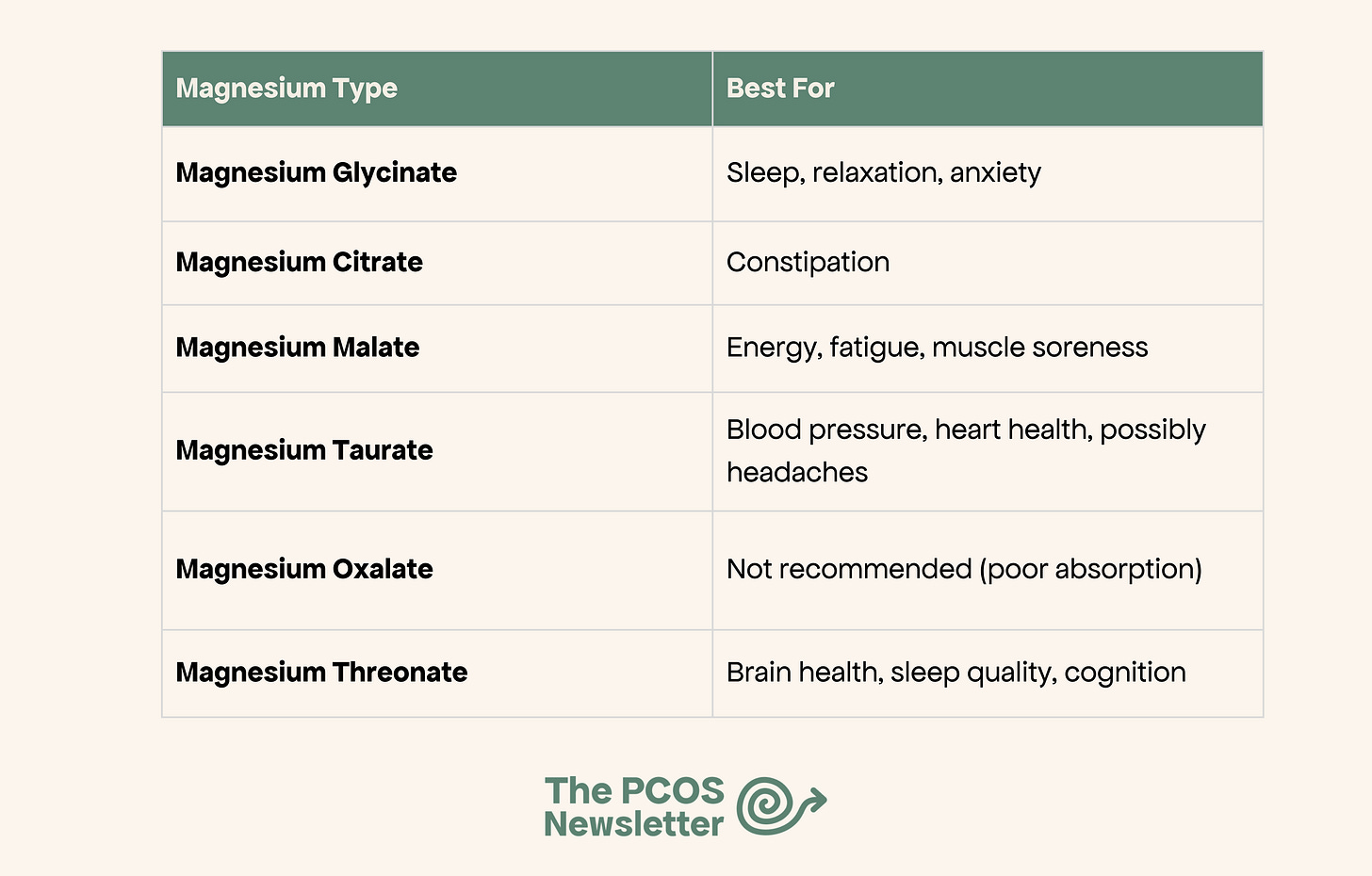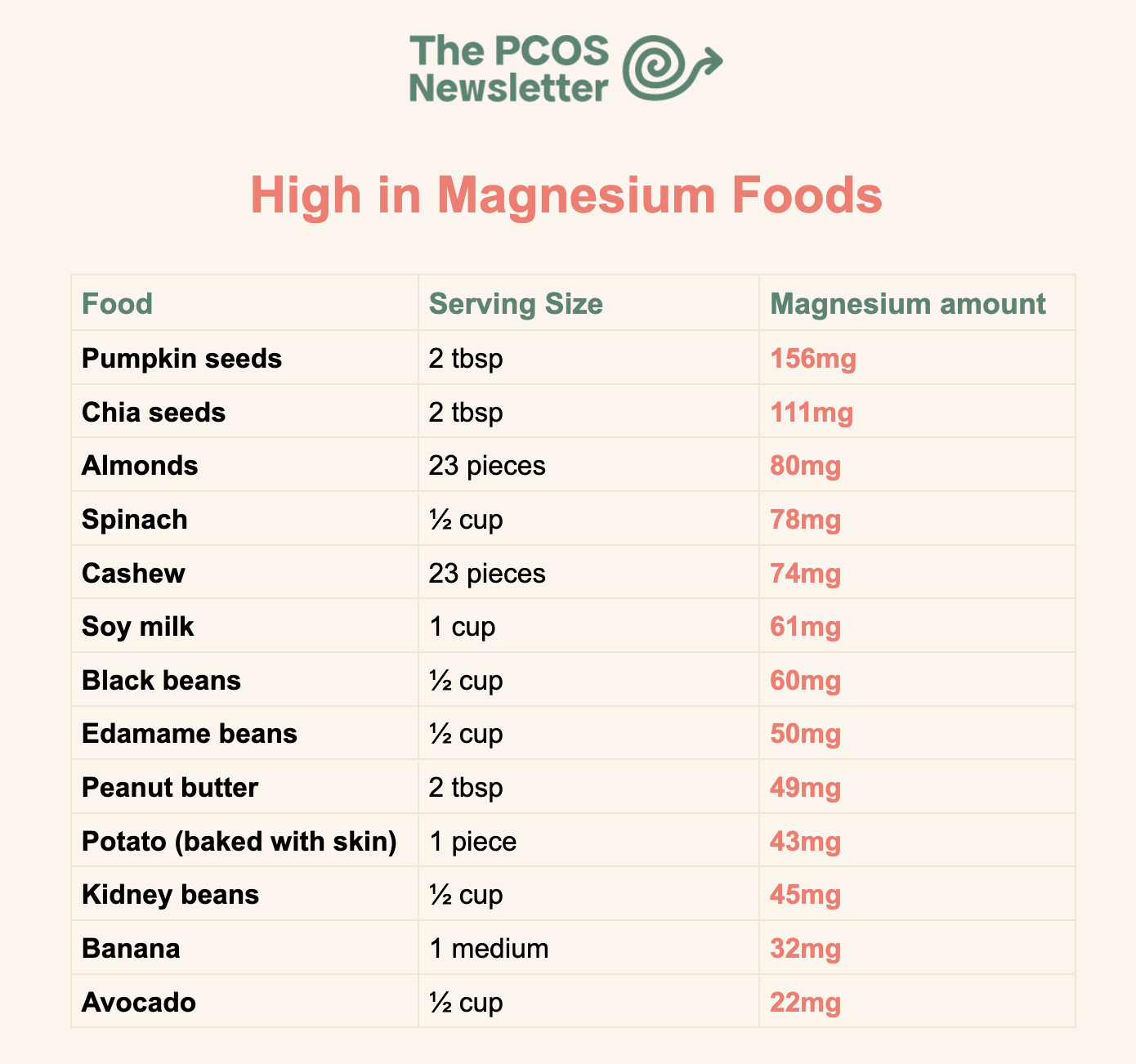What Magnesium do I take?
The 6 different types of Magnesium
Hello,
If you have ever been on the market for Magnesium, you will have noticed that it comes in many forms: glycinate, turate, malate etc. Let’s go through the different types and what you should take them for, ending on which one is best for PCOS.
If you are specifically interested by the link between PCOS and Magnesium, including a list of food high in Mg, I have a whole article written here:
Magnesium is very chemically reactive and can’t be taken on its own in a supplement, hence why you will see it bound to other compounds. These compounds can make certain magnesium supplements more absorbable but also enhance it’s function in different parts of the body. Due to its involvement in every cells in our body (as it facilitates ATP production and DNA,RNA synthesis), Mg will be distributed to all areas. I also want to caveat that supplementing Mg works if your levels are low, not as an additive. Your body is very good at regulating the levels of nutrients in your body so it won’t just keep more Mg for the future.
Magnesium Glycinate
This is the Magnesium I would most recommend to those who struggle with sleeping or relaxing. Here is why:
In this form Mg is bound to the amino acid glycine, creating a stable compound that is easily absorbed by the body, giving it less gastrointestinal issues.
Glycine is itself acts as a neurotransmitter that helps regulate nerve signals in the brain and spinal cord, promoting a calming effect on the nervous system.
Magnesium on the other hand, blocks the glutamate receptors. Glutamate is the main neurotransmitter that make our neurons fire. In a state of excessive brain activity (like when you can’t fall asleep because your brain is overthinking), you want Mg to sit on those receptors to tell your brain to calm down and prepare for the evening. In addition, Mg promotes the activity of GABA, our most calming neurotransmitter. Think about it as the signal your body needs to say: let’s relax.
Dosage recommended: 200-250mg, 1-2h before sleep.
Magnesium Citrate
This is the Magnesium I would recommend for constipation.
In this formulation Magnesium is bound to Citric Acid. Citric acid is a naturally occurring organic acid found in citrus fruits like lemons, limes, and oranges. It is highly water soluble increasing the bioavailability of magnesium, meaning the body can absorb and use it efficiently.
Citrate has an osmotic effect meaning it can draw water into the intestines, which softens stool and promotes bowel movements. Yuhuu. Very handy when you are travelling…
Dosage: 200–400 mg
Magnesium Malate
Malate refers to malic acid, a naturally occurring organic acid found abundantly in fruits, especially apples.
Malic acid is a key intermediate in the ATP production in mitochondria. Magnesium is also involved in energy production, so together they form a great support for energy.
This comibination of Magnesium has some research to suggest that can help those chronic fatigue syndrom and fibromalgya. Due to this is often recommended for muscle soreness and fatigue, even though the aren’t many studies to show specifically that this type of Mg will help you post-gym.
Magnesium Taurate
Taurine is a sulfur-containing amino acid found in high concentrations in the brain, heart, and muscles. It plays important roles in bile salt production, calcium regulation and neurotransmission. Taurine itself has demonstrated benefits such as stabilising blood pressure and reducing arrhythmia risks.
There is some evidence to suggest it can lower blood pressure as Magnesium is also a calcium channel blocker (promoting vessel relaxation and lowering blood pressure) but more human studies are needed.
You might see people recommending this one for headaches, as taurine promotes the production of GABA, the calm neurotransmitter. However I was unable to find much evidence for this type of Mg combination for headaches specifically.
Magnesium Oxalate
Oxalic acid is found in many plants, especially leafy greens as well as vegetables and some fruits. It’s the compound that may lead to kidney stones if consumed in excess. Magnesium oxalate has very low solubility in water which means the body absorbs very little magnesium from magnesium oxalate compounds, making it an inefficient supplement. However when I look at studies this is often the used supplementation format, perhaps because they only discovered the poor absorbability later or because you can usually pack more Mg in one capsule as oxalate takes less space so you make up for the loss in absorption.
Magnesium Threonate
This Magnesium form is combined with with L-threonic acid, a metabolite of vitamin C. This form is the new kid on the block. Some early stuides suggest that the L-threonic acid helps Mg cross the blood brain barrier more easily, increasing the amount of Mg that goes to the brain.
A few placebo-controlled trials show 1–2 g/day magnesium threonate can improve objective measures of sleep quality and subjective feelings of restfulness.
Best Magnesium form for PCOS
A systemic review from 2022 showed the Mg alone is not able to influence our markers, however when combined with vitamin E, zinc, calcium, or vitamin D, showed great results for lowering inflammation and glucose markers. In addition, a review from 2025 showed, NO significant effects of magnesium supplementation alone on cardiometabolic risk factors or hormonal parameters in PCOS.
So overall, I wouldn’t take Mg for PCOS but for some of its other benefits, if you need it.
A word of caution
Regardless of what Mg is bound to it won’t just get delivered to a specific organ and we wouldn’t want that. Mg is involved in so many of our body’s processes that we want them to be distributed everywhere. The form you chose might influence its effects but only marginally, so I wouldn’t stress about which one. In addition, getting enough Mg from your diet is far more important then supplementing.
There is an argument to say that, depending of where you buy your vegetables, the soil has been so over used by mass production that we are depleting it of key minerals like Mg and as a result our food don’t have the adequate amounts of minerals. This has been supported by some researchers.
There is also genetic considerations with Mg that I talk about in the the article above.
However supplementing for the rest of our lives is not an option either. If you are feeling specific symptoms, I would recommend using a good brand of Mg but otherwise eating the foods high in Mg will also be enough.
See you next Sunday,
Francesca




